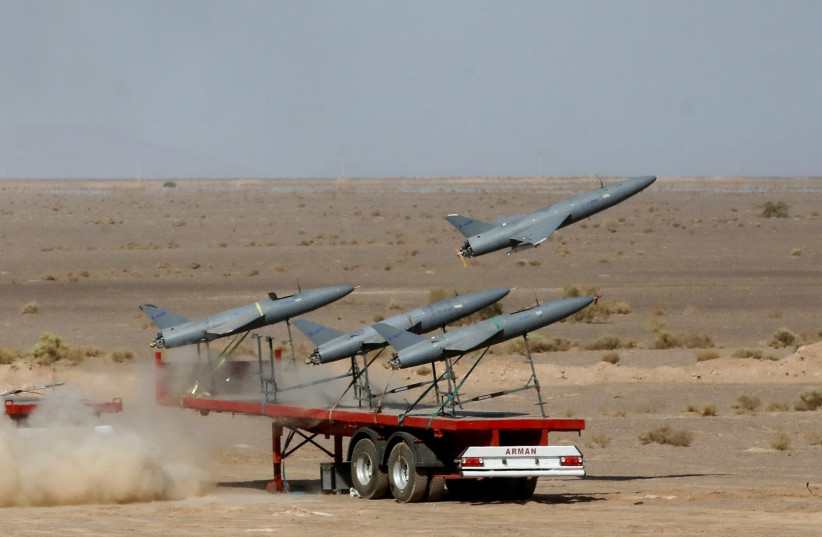Israel is increasingly concerned about the dangerous rapprochement between Russia and Iran. That’s what Prime Minister Yair Lapid said recently, as quoted in The Jerusalem Post. He was specifically referring to Iranian drones used by the Russian military in its military operations in Ukraine.
Lapid spoke of his country’s daily assessments to reconsider its position on the events in Ukraine. This assessment of the seriousness of the Iranian factor in the war in Ukraine is notable not only in the Israeli case but also in the case of the Gulf.
In the latter case, there are many common elements of Israeli concern, especially regarding the growth of Iranian influence and the prospect of an Iranian-Russian alliance of interests. We are well aware that the Israeli side has vital overlapping calculations regarding its position on Ukraine. It has important motives for accurately analyzing its steps in this regard.
But that does not negate the fact that at the same time it has valid concerns about Iranian intervention in the war. Lapid said Russia’s delivery of drones is further evidence that a return to the 2015 Iran nuclear deal is unworkable. Iran’s assertion of its military capabilities increases the regime’s boldness and makes its foreign policy more aggressive.
The situation of the Iranian regime many years ago is not what it is now. Its implicit docility to the United States when it invaded Iraq in 2003, fearing that it would finish its job in Iran, is no longer so. Today, it finds that a major power like Russia, a drone industry leader, is asking for the same planes to bolster its conflict positions.

This is happening regardless of any justification or motive that some might say, such as the low cost of Iranian drones or the need for huge quantities that cannot be produced in such a time frame in Russian factories, not out of technological motivation or for the combat advantage of these drones.
The result is simply that Russia is at war with Iranian weapons in Ukraine and that in itself is one of the results the mullahs want. Of course, one important gain for Iran in supplying drones to Russia is the recognition of their combat capabilities in a complex conflict environment like Ukraine. It contributes to its development and enhances its effectiveness and operational prowess.
Strategic benefits on each side
There are other strategic benefits, as well. Some of them may be in the form of concessions in Syria, expected to attract less Russian attention than before, as the Kremlin is concerned about Ukraine and its continuing aftermath. Moscow will find no better ally than Tehran to hand over its mandate in Syria.
This will certainly have negative consequences for the Israeli side, and indeed for the Arab side as well – it would mean that Syria is lost forever. Iran’s influence is growing not only in Syria but also in Iraq and Lebanon.
There is a strong possibility that Iranian support for the Houthis will increase before the end of their plan in Yemen, as the West stalls, worried about the aftermath of the war in Ukraine and the energy crisis, from which Western economies will emerge only after great suffering.
The US and its Atlantic allies have been relatively neutralized from their traditional sphere of influence, both by their choices and strategic mistakes, as Washington has done, and by increasing pressure and shifting priorities, as Europe has done.
So Iran has a valuable opportunity, or so its leaders think, to complete its regional project, especially after the regime dodged the recent mass popular protests. The question here is this: Can Russia be seen as supporting Iran to increase its regional influence as a response or in exchange for the latter’s support in the war in Ukraine?
The answer to this question is the mind of President Putin, who finds himself in a very difficult strategic position and certainly, every supporting role will have its price, especially if the situation ends up in his favor.
But we can emphasize that the Russian president’s strong relations with countries such as the UAE and Saudi Arabia will be a strong brake that will give us confidence that Russia will not support Iran against the Gulf in the future. It is not just a question of seeking a partnership with these countries but given the scale of mutual strategic interests throughout the Gulf.
An example of this is the fact that some of the Gulf states have set out to build a balanced relationship and maintain neutrality between Russia and the US. Putin understands that the untold balance is actually in favor of Russia rather than the West, with the negative dealing pattern coming from American circles specifically toward the Saudi partner.
As for Israel, Iran is well aware that it cannot start a war against it. Tehran, for its part, will not give a reason to form a Western military alliance to eliminate its regime. Therefore, the emergence of an Israel-Iran confrontation still depends on Israel’s decision, not Iran’s.
It depends on many calculations, chief among which is Iran’s provocative behavior in Syria and Lebanon. Another very important point concerns the possibility of Russia’s technological support for Iran’s nuclear program. My view is that Iran no longer needs this support as much as it needs political cover and support from a large country like Russia for its nuclear activities.
Russia itself, with all its diplomatic and strategic powers, is not in a position to transfer influential nuclear expertise to Iran.
Converging interests tactically does not necessarily mean continuing them strategically. Russia realizes that by doing so, it will infuriate not only Israel but also the Gulf states and many other parties such as Pakistan and Turkey, as well as Afghanistan, a front that Moscow wants to keep cool.
The writer is a UAE political analyst and a former Federal National Council candidate.
